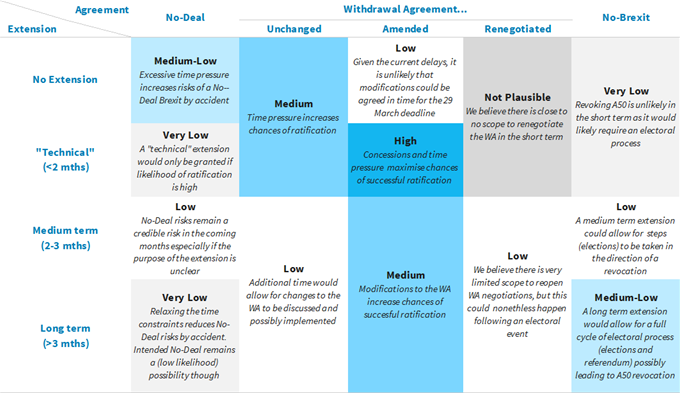Barclays: Article 50 won't be delayed because it 'favours a no-Brexit outcome'

Barclays thinks Britain’s exit from the EU is unlikely to be delayed significantly past March as it could lead to Brexit being cancelled — something Brexiteer politicians and voters would not allow.
In a note sent to clients on Wednesday, the bank said it believes MPs will approve prime minister Theresa May’s deal with minor amendments before the looming March deadline. Barclays said it is possible there may be a short “technical” extension of Article 50 — less than two months — if a deal looks likely to be approved, but only to allow time for it to be processed.
Anything longer than a two month extension looks highly unlikely, Barclays analysts Fabrice Montagné and Sreekala Kochugovindan said Wednesday.
“Long-term extension of Article 50 favours a no-Brexit outcome as it would allow for an election or referendum, potentially leading to Article 50 revocation — a scenario we do not regard as possible in the short term,” according to the analysts.
READ MORE: Why Brexit is likely to be delayed beyond 29 March
Article 50 is the official mechanism controlling Britain’s exit from the EU. The UK is set to leave the EU on 29 March, in just 50 days. However, MPs have yet to approve a withdrawal agreement and politicians on the right in the UK have strong objections to the so-called “Irish backstop.”
The European Court of Justice ruled in December that the UK has the power to revoke Article 50, thereby stoping Brexit. This has led to suggestion that the UK could ask for an extension of Article 50.
Barclay’s prediction came on the same day that the UK opposition party Labour said an extension is the only “sensible” option.
In their note, Montagné and Kochugovindan set out a framework for the most likely outcomes for Brexit going forward. The analysts believe May’s deal will likely be approved by politicians after minor amendments from the EU. The spur for MPs to change their minds and back the unpopular deal will be “time pressure as the clock runs down,” the analysts wrote.

A short-term extension of Article 50 for less than two months appears more likely than a long-term delay, but the Barclays analysts believe the EU would only allow this for procedural reasons related to officially ratifying the agreement.
“A technical short-term extension would likely only be granted if the withdrawal agreement is ratified or is close to being ratified,” according to the analysts.

 Yahoo News
Yahoo News 
